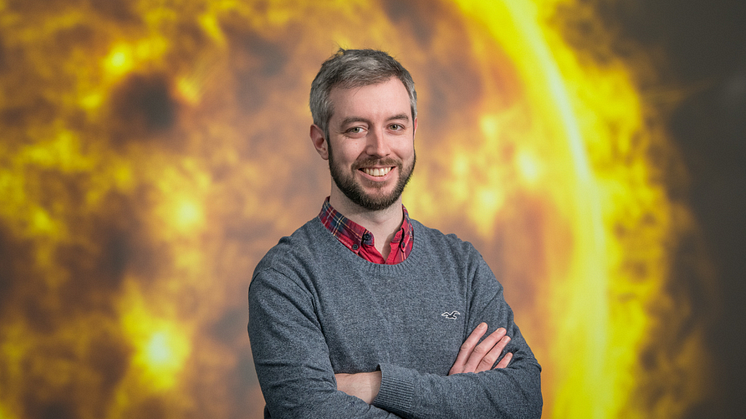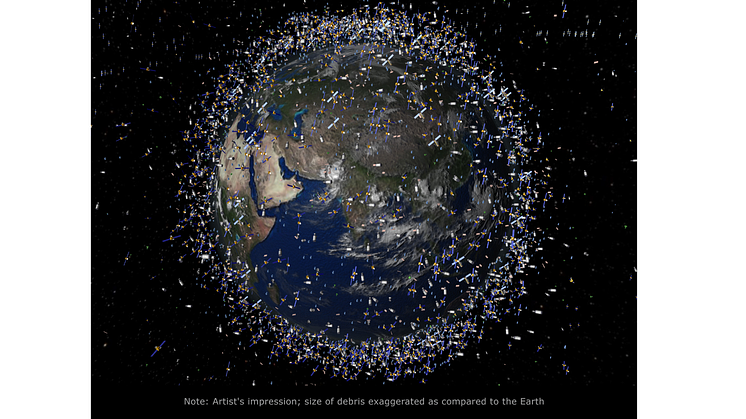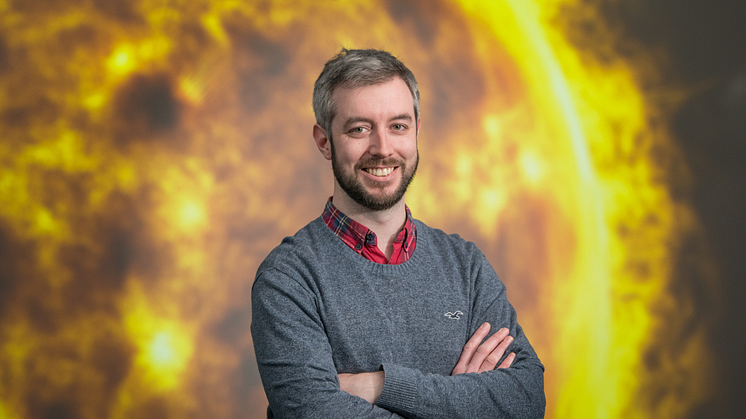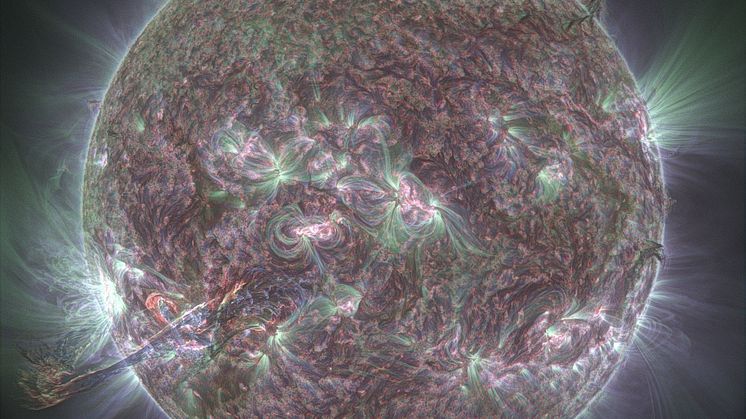
Press release -
Solar physicist honoured by Royal Astronomical Society
A Northumbria University scientist, who is developing new ways of predicting space weather using artificial intelligence, has been recognised by the Royal Astronomical Society for his work.
Dr Andy Smith is a world leader in the application of AI techniques for the understanding and prediction of space physics, with his models used by the Met Office to inform space weather forecasts.
It was announced this afternoon that he has been awarded a prestigious Winton Award by the Royal Astronomical Society, reflecting the impact he has made in his field of research.
Each year the Royal Astronomical Society recognises significant achievement in the fields of astronomy and geophysics through awards, medals, and prizes, encompassing different types of talent, from research to education and outreach.
Dr Smith was recognised for his use of data analysis, algorithm development, computer simulation, and machine learning in developing new methods for monitoring activity from the Sun, and its impact on Earth.
Activity such as solar eruptions, known as Coronal Mass Ejections, results in plasma being fired towards Earth at supersonic speeds, which can result in serious disruption to power and communication systems.
With our increasing reliance on technology, solar storms pose a serious threat to our everyday lives, leading to severe space weather being added to the UK National Risk Assessment for the first time in 2011.
Through his research, Dr Smith is exploring how physics-inspired machine learning could be used to forecast space weather more accurately and predict serious space storms.
Speaking about his award, Dr Smith said: “I’m honoured to have even been nominated. I feel immensely privileged to have had excellent opportunities over the last couple of years, and I’m grateful to work with such incredibly talented colleagues and collaborators.”
Last year Dr Smith was awarded a Research Fellowship from the Natural Environment Research Council (NERC), worth half a million pounds, for his Next Generation, Physics-Inspired AI for Space Weather Forecasting project.
Dr Smith and his team are analysing huge amounts of data from satellites and space missions over the last 20 years to gain a better understanding of the conditions under which storms are likely to occur.
They are using that information to develop cutting-edge computer models which can predict when such storms could occur in future, forecasting phenomena such as the northern lights, or aurora.
In addition to his academic research, Dr Smith was also recognised for his public engagement and outreach, including through the University of Southampton Planeterrella project, and through the UCL ORBYTS initiative, engaging with school pupils from disadvantaged backgrounds.
The Royal Astronomical Society award announcements were made at the Ordinary Meeting of the Society held today (Friday 12 January 2024), including the winners of the 2024 Gold Medals, which recognise lifetime achievement.
Two are awarded each year: one for astronomy, and one for geophysics, with past winners including Albert Einstein, Edwin Hubble, and Stephen Hawking.
This year’s Gold Medal winners are Professor Gilles Chabrier, of the University of Exeter and Ecole Normale Superieure de Lyon, CNRS, an astrophysicist known for his work on brown dwarfs; and University of Oxford's Professor John-Michael Kendall a geophysicist whose career has taken him to the hottest and coldest places on Earth.
Professor Mike Edmunds, president of the Royal Astronomical Society, said: "It is an honour to recognise such remarkable talent in the fields of astronomy and geophysics.
"Exactly 200 years ago we awarded the first Gold Medals to Charles Babbage and Johann Franz Encke.
"At the time, one of the main objectives of the Astronomical Society of London (it became the Royal Astronomical Society in 1831) was to encourage and promote the study of astronomy ‘by bestowing medals or rewards on successful research’.
“The range of our awards has broadened since then, but the standard of the work they reward has remained extremely high – as a glance at this year’s winners will demonstrate.
"I hope (with the Royal Astronomical Society founders) that the awards will continue to inspire and advance the study of astronomy and geophysics, both now and in the future."
Northumbria University is a world leader in the field of Solar and Space Physics and recently announced the new North East Space Skills and Technology (NESST) centre, enabled by investments of £10 million from the UK Government and £15 million from the UK Space and Satellite division of Lockheed Martin, match funded by the University.
Topics
Categories
UNIVERSITY OF THE YEAR 2022 (Times Higher Education Awards)
Northumbria is a research-intensive university that unlocks potential for all, changing lives regionally, nationally and internationally. Find out more about us at www.northumbria.ac.uk
--- Please contact media.communications@northumbria.ac.uk with any media enquiries or interview requests ---












